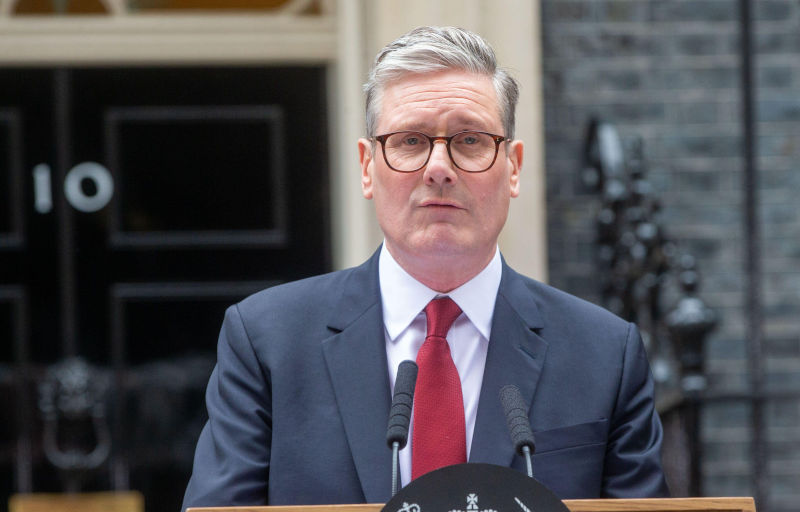Stephen's recent articles

30 July 2024
Starmer may fix the NHS, but wholesale change is needed in our Western societies for better health
The glories of modern medicine are abundant: diseases once considered incurable are now within therapeutic range. Recently a new mechanical heart, developed by an Australian and weighing a mere half kilo or so, was successfully installed in a patient in the US. While its long-term effectiveness awaits proof, it has been hailed as a turning point in the management of chronic heart failure. The pharmacopoeia of miracle drugs keeps growing. No technical limits on our ability to prolong and improve life are yet apparent.

2 October 2023
International students – where is the strategy?
There are twice as many international students from Singapore than there are from Indonesia studying in Australian universities, although Singapore has a population of 6 million and Indonesia has a population of 277 million. In 2019 (before Covid) more students in Australian universities came from Nepal than from any SE Asian country.

6 March 2023
Seeing university reform through an ethical lens
The current review of Australia’s higher education sector, the Australian Universities Accord (the Accord), aims ‘to drive lasting and transformative reform in Australia’s higher education system’. We propose that this review be undertaken through an ethical lens.

14 August 2022
Integrating care for better health
Complexity is part of our contemporary experience and mind-bogglingly complicated health systems make even small changes difficult and broad reform almost impossible.

13 August 2022
Tackling junk food
Australia’s Children a report from the Australian institute of Health and Welfare (AIHW), was published in 2019 and updated this year. It struggled to find data that would enable a comprehensive understanding of our children’s nutritional and physical activity status.

14 May 2022
Do we continue down the pathway of privatisation of health by stealth?
Loss of public funding for specific aspects of health care despite overall (public and private) increases in expenditure, as detailed recently by John Menadue, has already happened out of sight.

8 January 2022
It's not only us, Mr Morrison:the government must also play a part in fighting Covid
The pandemic has weaponised the argument that individual responsibility for one's health is best – free from government edicts. This is pathetic.
4 October 2020
COVID-19 and Poverty
That health and illness are close associates of wealth and poverty is well known. This dictum applies to covid-19 both within and among nations.
30 July 2020
Caring for older Australians
Covid has blown the cover on much of what we need to maintain credibility as a humane nation. Care of older Australians is of priority concern.
15 April 2020
STEPHEN LEEDER: The public health discipline after Covid-19
The Coronavirus pandemic draws our attention to the importance of public health in maintaining global human health. Public health as a discipline is distinguished by taking the entire community into account rather than individual patients, and seeking out what can be done to protect and promote human flourishing for all in that community.
14 April 2020
STEPHEN LEEDER.We’ve flattened the curve, but the nation’s health is still in danger
2020 is not panning out to be the Year of Tranquillity in Australia.
31 March 2020
STEPHEN LEEDER. The ambiguity of herd immunity and the coronavirus
In the US, the first formal clinical trial of a drug to treat coronavirus and of a vaccine give us a good moment to reflect on the immunology of this illness.
5 March 2020
STEPHEN LEEDER. Health guidelines may be necessary but are not sufficient for optimal medical care.
There is a common belief that medicine in all it variety would be better practised according to strict rules and guidelines.
16 December 2019
STEPHEN LEEDER. Is the Climate right for Discussions about how to Adapt?
Whatever the cause of our changing climate – natural variation or human-made – we should invest in adaptation.
20 November 2019
STEPHEN LEEDER- Global Change and Us
Recent fires in Australia and California have provoked discussion about the effects of climate change. These extreme events, not unknown in times past, seem to be more frequent now and suggest that the recorded changes in global temperature may be responsible. Blame – a common feature that follows disasters – is variously ascribed to political inertia over fossil fuels or local failure to take evasive preparative action as through preventive hazard reduction. Political polarisation has followed. We need a good dose of cooling off before developing effective stronger coping strategies.
28 October 2019
STEPHEN LEEDER - GRETA THUNBERG- A child shall lead them.
Swedish teenager Greta Thunberg has changed the conversation about global heating. Her passionate concern and emphasis on its likely impact on people her age has stirred public concern in a fresh way. How dare we, she asks of us older generations, respond with complacency, arrogance and inertia to such a threat? Wisdom, concern, and attention to the science can enable us to respond much better.
7 December 2018
STEPHEN LEEDER. Private-public partnerships – the good, the bad and the ugly.
Partnerships between public agencies and private providers demand unusual degrees of vigilance of both parties to ensure that the contract between them explicitly states – in great detail – their individual expectations and accountabilities. Values will differ. The agreement should, if possible, be tested component by component before “going live.”
30 October 2018
STEPHEN LEEDER. Health and wealth travel together.
Self-contained health programs directed at infectious diseases such as HIV, TB, malaria have wrought miracles, saving lives and enhancing prosperity. But a new challenge is looming globally, as subtle as climate change. No self-contained ‘vertical’ programs work for non-communicable disease: here we need health systems that span conditions and facilities, linking hospitals to general practice and community services for a wide variety of patients and conditions, from chronic heart disease to mental illness. Investment in health systems that address these needs is necessary (though not sufficient) for enhancing future productivity.
19 September 2018
STEPHEN LEEDER. Employing less qualified people in aged care
The Royal Commission announced this week will have a full agenda. If it can help us get aged care back on track we will all be the richer.
13 September 2018
STEPHEN LEEDER. The Evil You Cannot See.
Concern about air quality in Australia popularly centres around two topics: exhaust stacks from city road tunnels and climate change. Neither are as critically important as the effects of small particle pollution.
2 July 2018
STEPHEN LEEDER. Reviewing the Book of Kells’ schedule of medical fees.
Government contributions to medical fees are set out in a large book of rules. It is under review. But are rules for individual fees for individual services the way to go? Fee-for-service may be running out of date.
27 June 2018
STEPHEN LEEDER Taming the nuclear tiger
Among major threats to human and planetary survival, none comes close to nuclear war.
17 April 2018
STEPHEN LEEDER. Home (not so) sweet home
Medical homes, where you as a patient are known personally by name and history and where a team of health professionals, generally led by a general practitioner, arrange and provide your care, have not taken off as expected. Why?
3 April 2018
STEPHEN LEEDER. Morality And Health.
Writing last Thursday in the Conversation about the South African cricket scandal, Michelle Grattan pointed to politicians “who would prefer to overlook awkward parallels with conduct in politics – for instance the endemic tampering with the ball of truth.”
6 March 2018
STEPHEN LEEDER. Two roads converge in a yellow wood
Two roads converge in a yellow wood when it comes to preventing obesity – blaming the victim (eat less sugar, exercise more, you lazy sloth) and thinking that if we focus on children all will be well. Follow either and you will end up in the same sulphurous place – lost.
26 January 2018
STEPHEN LEEDER. Forget the Dog: make 2018 the Year of the Sceptic.
Much medical research is incomplete or wrong. The participation of drug companies in sponsored research and continuing education for doctors whereby the results of research are communicated to them demands healthy scepticism.
9 January 2018
STEPHEN LEEDER. Alcohol and sport. A REPOST
Queensland's victory over NSW in the 1 June game lin 2016 was reported as the highest rating State of Origin match ever and 'the top TV event of 2016.' Both teams carried alcohol advertising on their clothing into the match. The association of alcohol with sport is deep, complex and profitable. Sport provides a lucrative vehicle for advertising and in turn many codes have come to depend heavily on the support of alcohol sponsors. The relationship is one of co-dependency.
4 January 2018
STEPHEN LEEDER: A little bit of sugar may (or may not) make the weight go down.
The statistics do not support the view that there are big differences in sugar consumption between the fat and the thin. We need to define our enemy clearly in the battle against obesity.
2 January 2018
STEPHEN LEEDER. Social causes of illness are not immutable: they are amenable to change.
Modifying our own behaviour in health-promoting directions is sensible but for sustainable, nation-wide change we need to take action of a different kind.
5 December 2017
STEPHEN LEEDER. The double-ended spoon and how to meet our health needs
The Productivity Commission has recognised how joined up care for people with serious and complex illnesses can enhance their quality of life. Opportunities to prevent these problems abound and the time for action is now.
28 July 2017
STEPHEN LEEDER. Comparing health systems in 11 countries
A new report comparing health systems in eleven countries gives Australia a pat on the back but not for equity. What’s going on?
26 July 2017
STEPHEN LEEDER. Review of the Medicare Benefits Schedule.
The Medicare Benefits Schedule, or MBS, is the basis for Medicare payments made for medical care in the community. It runs to over 900 pages and contains 5,700 items. Well over $2Ob pass through its ledger each year. It includes long and short clinical consultations and surgical procedures ($17b), pathology tests ($2.65b) and x-ray and other imaging ($3.2b) that form the bulk of out-of-hospital care, mostly but not entirely ($1b not) provided by doctors.
7 July 2017
STEVE LEEDER. Health care: getting it right the first time
Ronald Reagan once famously quipped that the nine most terrifying words in the English language are ‘I’m from the government, and I’m here to help’. But that doesn’t, for one moment, stop Michael Horrocks, Professor of Postgraduate Surgery at the University of Bath and a former President of the Vascular Society of Great Britain and Ireland, relaying precisely that message to a room full of vascular surgeons and interventional radiologists. ‘We are here to help,’ he says. ‘We are not the Care Quality Commission. We are here to serve. …There will be plenty of chance to comment as we go...
30 June 2017
STEVE LEEDER. A welcome review of the Medicare Benefits Schedule
In 2015 Sussan Ley, then the Minister for Health, established a review of the schedule of fees for medical benefits. The review of the schedule's 5700 items, involving a rigorous evidence-based process, is now around half way through. When completed it will provide an opportunity for more cost-effective health care and a saving of public revenue.
19 January 2017
STEPHEN LEEDER. Over-servicing in health.
Abuse of Medicare or other reimbursement schemes is much easier if the regulations surrounding it are lax. That is what makes the current review of Medicare so important so that the rules are clear and make the best match possible between cost and benefit. This will result in less temptation to overuse useless procedures that might make the clinician rich but do nothing – and perhaps even harm – the patient.
18 June 2016
STEPHEN LEEDER. Looking forward to a national health policy and not ignoring the community.
Health policies presented as part of the election campaign should address our expectations for prompt, courteous and effective high-quality care when we need it and not be a random collection of thought balloons - from a child’s birthday? - about waiting lists and co-payments . Health care is essential to achieving goals for more jobs and a brighter budget. Its availability to all is a fundamental of fairness. Labor or Coalition, health policy is critical to what they hope to achieve for us. Here is why we should be hearing a national health policy from the contestants.
4 June 2016
STEPHEN LEEDER. Alcohol and sport.
Queensland's victory over NSW in the June 1 game was reported as the highest rating State of Origin match ever and 'the top TV event of 2016.' Both teams carried alcohol advertising on their clothing into the match. The association of alcohol with sport is deep, complex and profitable. Sport provides a lucrative vehicle for advertising and in turn many codes have come to depend heavily on the support of alcohol sponsors. The relationship is one of co-dependency.
15 September 2015
Stephen Leeder. The takeover of the Medical Journal of Australia.
A quick glance at the last page of the most recent issue of the MJA reveals that there is as yet no replacement editor-in-chief and that two of the most senior medical editors – Janusic and Armstrong – are missing in action, as is the Editorial Advisory Committee. There is an interim editor. Many of the assistant editors have gone as well – replaced in the AMA president’s memorable words on ABC Radio because all they did was move words around on the page. This they had been doing, together with checking facts, assertions, arithmetic, grammar, syntax, clarity and originality...
2 March 2015
Stephen Leeder. Telling the story of mental health.
It is unusual for Foreign Affairs, a magazine published by the United States Council on Foreign Relations in New York, to contain articles on health, but the first issue of 2015 carries an essay (Darkness invisible: the hidden global costs of mental illness) by three distinguished scientists from the National Institute of Mental Health about the hidden costs of mental health.1 Based on evidence from a 2010 Harvard University study on the current and future burden of disease,2 they state that “the direct economic effects of mental illness (such as spending on care) and the indirect effects (such as lost...
2 June 2014
Stephen Leeder. Electronic medical records for patients!
Australia embarked on an ambitious journey when it committed to developing a medical record that would go with each patient to whatever health care provider they consulted. “The eHealth record system — launched in June 2012 — is an electronic record for a patient that contains a summary of their health information.” http://www.nehta.gov.au/our-work/pcehr This personally-controlled version, known as PCEHR, was rather akin to establishing a colony on Mars – maybe best to get to the moon first. The enterprise was reviewed in depth last year after faltering. The new federal government maintains a modest investment in the project. ...
8 September 2013
Facing the future. Guest blogger: Prof. Stephen Leeder
Facing the future in a world where black swan events change everything. When considering what we may be facing with a new federal government in Australia, a wise starting point would be a conversation with Nassim Nicholas Taleb, he of the Black Swan theory. Taleb has written extensively, using the discovery of black swans in a world that did not believe they existed as his metaphor, about the impact of unpredictable game-changing events. Such events (9/11, the tsunami that led to the Fukushima catastrophe, the internet) change the course of history but we do not see them coming....
